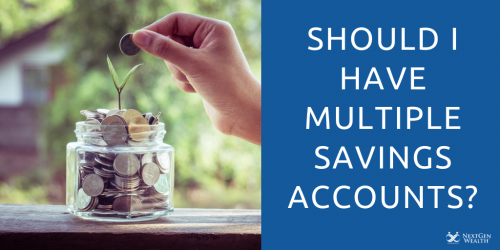Should I Have Multiple Savings Accounts?
If you’re like 69% of Americans, you may have less than $1000 saved. Putting money away is a struggle for many individuals, but part of the problem may be how they’re doing it. 
One possible way to make saving easier is to utilize multiple accounts. Today, we’re going to look at the various reasons you should be saving and the types of accounts you can use to reach your goal.
Reasons to Save Money
While it’s always good to have money in the bank, one way to make it easier to save is to have a specific goal in mind. All too often, when you are only saving for the sake of having extra funds, it’s easy to spend it without realizing it.
Your goals should be specific to your situation, but here are some common reasons to open multiple savings accounts.
Retirement
About 22 percent of Americans have less than $5,000 saved for retirement, yet most individuals will need upwards of seven figures to stay afloat during their golden years. No matter your age right now, retirement planning should always be a priority. The sooner you start, the longer your money can grow and the easier it is to accrue interest.
Ideally, you should be participating in an employer-sponsored retirement plan, such as a 401(k) or 403(b). What would make this program even better is if your employer offered matching contributions. Since this is free money, you want to take advantage of it as much as possible.
Emergency Fund
As any year illustrates, you should always be ready for a rainy day. However, if you don’t have money saved, you could find yourself in a bad situation almost immediately. What will you do if you can’t work due to injury or disability? What if you get an unexpectedly high bill, such as a car repair?
One of the best things about an emergency fund is that you can stop putting money away once you reach a specific point. How much is enough? Ideally, you should have sufficient funds to pay for at least one to two months of bills. If you can, aim for four to six months to have an even bigger buffer if something does happen.
Since you never know when disaster will strike, you want to be able to access your money quickly. However, we recommend putting at least a portion of your emergency fund into an account that earns interest.
This way, the money can grow until you need it. Keep in mind, though, that it can take a few days to withdraw from an investment account, so plan accordingly.
Vacation or High-Ticket Item
One of the reasons why Americans are struggling to save money is that they are saddled with debt. A household with a credit card has roughly $8,400 in debt, although it can be significantly higher.
Some debt is necessary, such as paying off a mortgage or student loans. However, if you are charging a credit card, that will only make the situation worse.
So, before paying for a new car or family vacation, it’s better to save money for the experience. As with an emergency fund, you can set a dollar amount and work towards it. Once you reach your goal, you can buy the item with confidence that you earned it.

Higher Education
If you have a child, one expense that will be looming overhead is college. Fortunately, you have roughly 18 years to save money to alleviate the burden of student loans. As we’ll discuss later on, one of the best options for educational funds is a 529 savings account. Start early and let the money grow until your little one needs it.
Why Multiple Savings Accounts Can Help You Reach Your Goals
With various financial objectives in mind, pooling all of your money into a single account can be problematic. Here are the top benefits of having multiple accounts for your cash.
Automate Your Savings
One of the best ways to ensure that you save money is to pay yourself first. Most individuals spend money once they get paid and then save whatever is left. Instead, you should turn it around so that you are saving first and spending later. Whether it’s $50 or $500 per month, reframing the process makes it much easier to stick to your goals.
So, by having multiple accounts, you can automate your savings. There are many apps out there that can handle this for you, meaning you don’t have to think about it. The more hands-off you can be with your money, the easier it is to avoid spending it.
Keep Track of Your Money Easier
Let’s say that you’ve decided to make some extra money. However, your side gig hires you as an independent contractor, meaning that taxes are not withdrawn from your paychecks. So, you need to be sure to put money away every time you get paid so that you don’t have a massive tax bill at the end of the year.
If you’re already saving for taxes, how can you be sure which money has to be kept aside and which can be used for emergencies? What about retirement savings? When pooling everything together, you have to find a way to keep track.
Instead, having multiple accounts allows you to get a clear picture of your savings goals without doing complex math. One account can be for taxes, another account is an emergency fund, and yet another is used for retirement or your next vacation. Best of all, by utilizing multiple accounts, you can adjust how your savings are automated more precisely.
Short vs. Long-Term Savings
There was a time when putting money into a bank savings account meant that you would get paid interest. Unfortunately, interest rates today are a small fraction of what they were in decades past. This means that even if your money sits in the bank for years, it won’t grow very much.
Another benefit of having multiple accounts is that you can earn interest on your funds. By splitting your money into short and long-term goals, you can maximize your earnings accordingly.
For example, since your retirement account will stay put for a long time, you can invest in something that might earn a better return. Alternatively, your vacation fund might be in a traditional savings account since you’ll spend it within a few months.
Types of Savings Accounts to Use
Now that you have your goals in mind, you need to know where to put your money to get the best return. Here are the various types of accounts you can use to reach your objectives more efficiently.
Traditional Savings Account
If you don’t have one with your bank yet, now is the time to start. In most cases, a traditional bank account doesn’t have a minimum balance requirement, which is beneficial for short-term needs.
High-Yield Savings Account
Some banks will offer accounts that come with relatively good interest rates. However, you may not qualify for one, at least at first.
Usually, you have to build a good relationship with the bank. If you have been wiih the same financial institution for years and don’t overdraft regularly, you may be able to open a high-yield account.
While you can earn interest, these accounts do come with minimum balance requirements. In most cases, you have to start with at least $500, but some banks may require $1000 or more. You may also be limited in how and when you can withdraw funds, so be sure to look at the fine print.
College Savings Account (529)
Putting money away for college is a challenge, but what if those funds could grow tax-free? With a 529 Savings Account, you can invest money for higher education without the burden of capital gains taxes.
Each state has its own rules about this account, so be sure to look up any specific requirements or qualifications. Another benefit of a 529 plan is that anyone can own the account, and anyone can contribute. So, if family members want to help pay for your child’s college, it’s easy to do.
Certificates of Deposit
One easy way to get a guaranteed return on your money is with a certificate of deposit (CD). Almost all banks offer them, although the interest rates will vary. The way a CD works is that you agree to put your money away for a specified period (i.e., one year).
The longer you don’t touch the funds, the better your rate can be. If you do need to withdraw early, you will have to pay a penalty.
Usually, a CD is an excellent choice for funds that you know you’re not going to touch for a while. This account is necessarily ideal for retirement, but it could be an excellent way to save for a high-ticket purchase.
One of the problems with a CD, though, is that you can’t add money regularly. Overall, it’s a way to get a return on your money, as long as you can wait for it.
Mutual Funds/Investment Accounts
If you want your money to potentially grow at a faster pace over the long run, you may want to invest it in the stock market. Mutual funds are a great option, so you can feel confident in investing in them.
Fortunately, there are many investment apps available that can help you get started. Some examples include Acorns, Robinhood, and Betterment. Best of all, if you’re interested in learning how to trade, some programs will give you more control over how you invest your money.
Individual Retirement Account
Along with a 401k plan, opening an IRA is a smart way to save for retirement. There are two options: traditional and Roth. A traditional IRA allows you to deduct contributions now and pay taxes later.
However, a Roth account comes out tax-free since you can’t deduct contributions from your taxes. These accounts are typically invested in mutual funds, making them a viable choice for long-term savings.
Contact NextGen Wealth Today
If you want to make your money work harder, you may need to find a professional to work with or even a great financial course. At NextGen Wealth, we can help you choose the right accounts to reach your goals.
We can also advise you on the best plan for your money so that you don’t have to worry about long-term milestones like college or retirement. Contact us today or click one of the links within to find out more.


